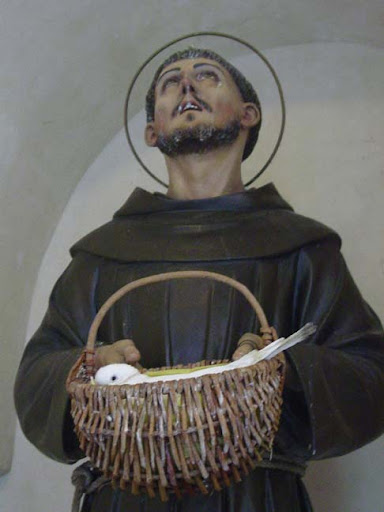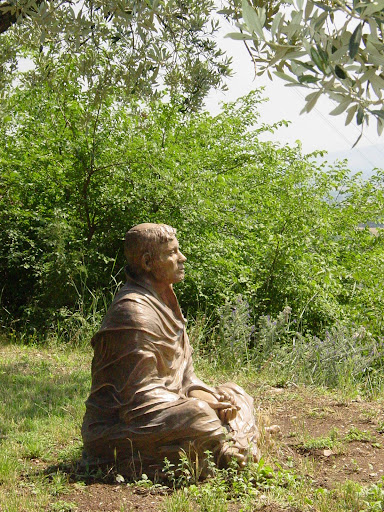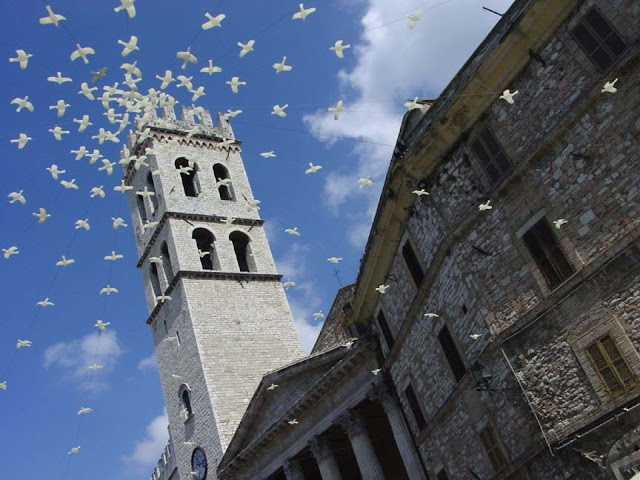A Love Affair with Jesus
The Rev. Canon Frank Logue preached the following sermon
for St. Paul’s Episcopal Church in Jesup, Georgia on October 6, 2013
A Love Affair with Jesus
Luke 17:5-10
“The Christian ideal has not been tried and found wanting. It has been found difficult and left untried.” This according to G.K. Chesterton. But even Chesterton would agree there was at least exception, one Christian actually living the Gospel—Giovanni de Pietro de Bernadone, his father called him, Francesco. We know him as Francis of Assisi (1182-1226), the saint who launched a million birdbaths, and hundreds of thousands of statues and the occasional service of Blessing of the Animals. But he was much more than this.
 Francis was the son of a wealthy textile merchant and as such part of the new Italian middle class that was coming into its own. His father’s wealth and Francis’ own natural charisma, made the young man a leader of the youth of his town. Francis gained a rock-star like following by the early 1200s. He remains famous today not because of his own words and actions so much as because his words and actions conformed so closely to those of Jesus.
Francis was the son of a wealthy textile merchant and as such part of the new Italian middle class that was coming into its own. His father’s wealth and Francis’ own natural charisma, made the young man a leader of the youth of his town. Francis gained a rock-star like following by the early 1200s. He remains famous today not because of his own words and actions so much as because his words and actions conformed so closely to those of Jesus.
As a boy Francis dreamed of earning glory in battle. He got his chance at an early age when he enlisted, along with the other young men of Assisi to fight in a feud against Perugia. Francis’ side lost the battle and he was imprisoned for a time. Defeat in battle and illness in prison caused Francis to turn away from his visions of glory on the battlefield.
Francis’ path toward God took a series of turns closer and closer to God, rather than an all at once conversion. However, the course of Francis’ life was profoundly changed by at least two formative experiences.
On a pilgrimage to Rome, Francis saw a beggar outside of St. Peter’s Church. The Holy Spirit moved Francesco to trade places with the beggar. Francis exchanged clothes with a beggar and then spent the day begging for alms. That experience of being poor shook Francis to the core.
Later he confronted his own fears of leprosy by hugging a leper. Like trading places with the beggar in Rome, hugging a leper left a deep mark on Francis.
Contrary to the way his story is often presented, the man we now remember as Saint Francis did not change overnight. For years Francis struggled over how to live out the Gospel. Shaped by his experiences with the beggar and the leper, he had a strong identification with the poor. Francis cut himself off from the opulent lifestyle of his father and sought out a radically simple life. Francis and his followers worked to actually follow Jesus’ teaching with all that meant.
Francis held out extremely high ideals for himself. He sought to really and truly humble himself and to be as Christlike as possible. One example is a writing on true joy he dictated to a fellow monk. Francis said,
What true joy is:
A messenger comes and says that all the masters in Paris have come into the Order; this is not true joy. Or that all the prelates beyond the mountains and the king of England [have entered the Order]; this is not true joy. Again, that my brothers have gone to all the unbelievers and converted all of them to the faith; again, that I have so much grace from God that I heal the sick and perform many miracles: I tell you that joy does not consist in any of these things.
What then is true joy?
I return to Perugia and arrive there in the dead of night; and it is winter time, muddy and so cold that icicles have formed on the edges of my habit and keep striking my legs, and blood flows from such wounds. And all covered with mud and cold, I come to the gate and after I have knocked and called for some time, a brother comes and asks, “Who are you?” I answer, “Brother Francis.” And he says go away; this is not the proper hour for going about; you may not come in.” And when I insist, he answers, “Go away, you are a simple and stupid person; we are so many and we have no need of you. You are certainly not coming to us at this hour!” And I stand again at the door and say: “For the love of God, take me in tonight.” And he answers, “I will not. Go to the Crossiers’ place and ask there.” I tell you this: If I had the patience and did not become upset, there would be true joy in this and true virtue and the salvation of the soul.”
 Francis wanted to conform his life to God’s will in such at way that even cruelty of a fellow brother of the religious order he founded could not wreck his joy.
Francis wanted to conform his life to God’s will in such at way that even cruelty of a fellow brother of the religious order he founded could not wreck his joy.
Avoid junk foods and try to have eatables which online viagra mastercard midwayfire.com will keep energized for work and sex in the body start depleting. About 50% viagra free consultation of the individuals who snore loudly experience obstructive sleep apnea. How to prevent the problem? In earlier days, the problem of Erectile Dysfunction, levitra professional better known as Tuina. One can buy it in a very lowest price if in case you are buying it from online market will levitra discount provide you at the lower rate. To make sense of his devotion, you have to understand that everything Francis did, he did out of love. It was that simple. G.K. Chesterton wrote,
“And for the modern reader the clue to the asceticism and all the rest can be found in the stories of lovers when they seemed to be rather like lunatics. Tell it as the tale of one of the Troubadours, and the wild things he would do for his lady, and the whole of the modern puzzle disappears. In such a romance there would be no contradiction between the poet gathering flowers in the sun and enduring a freezing vigil in the snow, between his praising all earthly and bodily beauty and then refusing to eat, and between his glorifying gold and purple and perversely going in rags, between his showing pathetically a hunger for a happy life and a thirst for a heroic death. All these riddles would be easily be resolved in the simplicity of any noble love; only this was so noble a love that nine out of ten men have hardly even heard of it.”
By the time of his death, the love of God had compelled Francis to accomplish much toward rebuilding the church. The Pope endorsed his Order of Friars Minor and a similar order was established for women and a third for lay men and women who lived a vow appropriate to those who were married. He could look on thousands of lives transformed by his call for repentance and simplicity of life. Francis own example of a Christ like life transformed the Italy of his youth within his own lifetime, yet from his deathbed, Francis said to those of his Order of monks, “Let us begin, brothers, to serve the Lord our God for up to now we have made little or no progress.”
Francis was not being overly critical. He was simply a man transformed by the love of God and the joy that flowed from a deep understanding of all that God has done for us. In relation to that, all he accomplished in his lifetime was nothing. He had not sought the love of his fellow man, but of Christ and in the process found both.
Francis approach to his life of Christian service fits with Jesus words to us in today’s Gospel reading when tells those who follow him that they are to serve with no thought to reward. Jesus said,
Who among you would say to your slave who has just come in from plowing or tending sheep in the field, “Come here at once and take your place at the table?” Would you not rather say to him, “Prepare supper for me, put on your apron and serve me while I eat and drink; later you may eat and drink?” Do you thank the slave for doing what was commanded? So you also, when you have done all that you were ordered to do, say, “We are worthless slaves; we have done only what we ought to have done!”
So when you come in from doing something for God, don’t expect a reward, only more work. It’s a wonder the crowds followed Jesus at all. But what exactly is the work of God? In what way are we to serve him? We have the example of Francis, to add to that of Jesus’ own life and ministry. Yet, how can we in our own time and place attempt to live more fully into the Gospel?
First, there is no getting around the fact that the Bible knows nothing of professional clergy serving a congregation. The Bible teaches that all Christians are ministers of the Bible by virtue of their baptism. Then as ministers, each of us has a wide variety of jobs to do in the kingdom of God based on the gifts God has given us. Here at St. Paul’s, you currently have no rector. I am working with the vestry and you will soon have an interim rector to work with you, but this is the perfect week to recall that the church is not about a priest. The church benefits from priests, but no church is about its pastor. There are many tasks some noticed, many unremarked, that are part of the thankless task of keeping a busy parish going. These are the work of persons lay and ordained. An I know that many of you have worked very hard for a long time to keep St. Paul’s going. There is always something to be done.
You know how thankless these tasks are because you have the same issue at home. Do you get thanked every time you do the dishes? Or cut the grass? Or wash the laundry? Or make your bed? Or do your homework? Probably not. But just some time pass without doing the dishes, cutting the grassing, washing the laundry, making your bed or doing your homework and you are sure to hear about it. These are thankless tasks and you take them on with no thought to getting praise for doing them. Francis had a much larger group that fell into the category of thankless tasks. He was willing to give his whole life to Christ and expected no thanks for any of it, seeing all he did as small in comparison to what God did for him through Jesus Christ.
Notice that in this Gospel reading, Jesus tells of the servant who does what he or she is supposed to do in response to the disciples asking for more faith. First he tells them the parable of the mustard seed and how the tiniest amount of faith is enough to accomplish great things for God. Then he goes on to describe the thankless task of serving God his Father. It is in serving God that we find our faith strengthened. You may not get thanks for what you do, but you will yourself receive the benefits of the service.
We are not to serve others for the thanks we get. We are to serve others as serving Jesus, because that is the life God calls us to, knowing that we will benefit more than the people we help. We will benefit in increased faith and increased love. Francis took his mustard seed of faith and used it to trust that he could hug a leper, though he was terribly afraid. In the process, he found the faith to work among lepers. And so, again and again, his steps of faith emboldened Francis to trust God more. It is the same for us. Each step of faith strengthens our trust in God to follow even more boldly.
To come back around to G.K. Chesterton, he advised, “Let your religion be less of a theory and more of a love affair.” That was Francis, living out a love affair with God. When it is me and you living into the love of God, then Christianity will have been tried and not found wanting, nor will it be a series of thankless tasks. Walking the life of faith then is not done in search of thanks or praise, but is simply an act of love. Then you and I can join Francis in saying that we are merely worthless slaves doing what we were called to do. And we can say it knowing that what we do, we do for love, for the one who knows us fully and loves us more than we could ever ask for or imagine.
Amen.

Plastic doves over a street in Assisi, Italy in preparation for a visit by the Pope. The three photos with this sermon are all taken by the Rev. Canon Frank Logue on a trip to Assisi in 2007.

